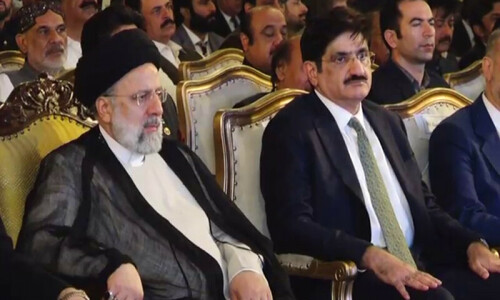ISLAMABAD: Pakistan will formally become an associate member of the world’s top nuclear physics laboratory, the European Organization for Nuclear Research – also known by its French acronym CERN – after ratification by the federal cabinet this month.
Pakistan had applied for CERN membership in February 2013 and the two sides signed an agreement for associate membership last December. Pakistan’s membership would, however, become effective after the federal cabinet ratifies the accord. The ratification of the agreement, which is already on the cabinet’s agenda, is likely before the next CERN council meeting, due to be held in mid-June.
Speaking at ‘Pakistan and CERN: Collaboration in Advanced Scientific Research’, a seminar organised by the Islamabad-based think-tank Centre for International Strategic Studies (CISS) on Thursday, Foreign Secretary Aizaz Chaudhry said: “Associate membership of CERN not only provides us the opportunity to project our civilian scientific capabilities, but is also a strong endorsement of them.”
The seminar was held to promote awareness about Pakistan’s collaboration with CERN and discuss ways to make the collaboration more fruitful.
CERN houses the world’s largest circular particle collider, also known as the Large Hadron Collider, with an approximate circumference of 27km. The collider straddles the Franco-Swiss border near Geneva and is the most advanced scientific experiment in human history.
Seeking to validate the existence of the Higgs Boson, the LHC runs lab simulations of the Big Bang and studies the nature of particle collisions. A large number of Pakistani physicists have also contributed towards the experiments being undertaken there.
Pakistan has been engaged with CERN since 1994, when it signed a cooperation agreement with the research organization. In the past, Pakistan provided equipment for one of the four main detectors at the LHC, which is also the world’s largest and the most powerful particle accelerator.
“With the status of an associate member, Pakistan would profit further from the increasingly innovative and challenging initiatives in science and technology. Deeper involvement in science and technology will open up avenues for the education and training of our students. CERN has already started cooperation with COMSATS and NUST in this regard,” Mr Chaudhry said.
Mr Chaudhry further said that entry into CERN would contribute to the country’s socio-economic development, besides enhancing its capability to use nuclear technology for peaceful and developmental purposes.
He said Pakistan had already proven itself to be a responsible nuclear state.
“The timing of our entry into CERN is very important,” Mr Chaudhry said, adding that Pakistan would be the first Asian state to get this status.
Associate membership of the 21-member research organisation would strengthen Pakistan’s long-term partnership with CERN.
Associate membership allows the country to attend meetings of the CERN Council, in addition to opening up job, training and career development opportunities at CERN facilities and projects.
Pakistani industry would also become eligible to bid for CERN contracts.
Dr Badar Suleman, a member of the Pakistan Atomic Energy Commission’s advisory council, said that Pakistan had inadequate infrastructure to fully benefiting from the collaboration.
Without immediately addressing the infrastructural issues, Dr Suleman was worried that the relationship would be a mismatch and emphasized the need to develop a strong R&D base in the country.
Published in Dawn, May 15th, 2015
On a mobile phone? Get the Dawn Mobile App: Apple Store | Google Play















































Dear visitor, the comments section is undergoing an overhaul and will return soon.